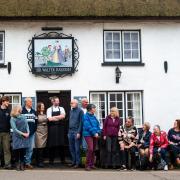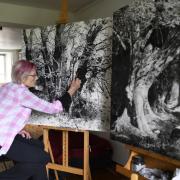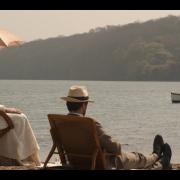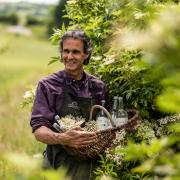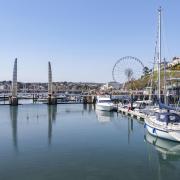Part of a ship’s anchor, fishing tackle, a traffic cone, tyres, tennis balls, a surfboard, a pair of Ray-Bans, plastic pallets, Christmas trees, a six-foot long fluorescent tube, and a Second World War sonar detector from a French submarine. Not the random spoils of a car boot sale. Or even a slightly eclectic eBay shopping list. These are just some of the items that have been collected from the North Devon coastline by one woman and her dog.
Sue Sherborne began litter-picking more than 20 years ago after becoming increasingly concerned at the amount of rubbish she was seeing. ‘There was no-one cleaning the beach,’ she says. The solution was obvious: Sue assumed responsibility herself. And she hasn’t stopped since.
With her side-kick, Pi, an impressive-looking Giant Schnauzer, Sue is an instantly recognisable figure in Westward Ho! and the surrounding communities. You’ll find her skirting the shoreline or roaming across Northam Burrows; black sack and black dog in tow. At 68-years-young, she’s out beach cleaning four or five times a week - come rain, sleet, snow or 90 mile-per-hour winds - clocking up an average of 15,000 steps a day, 80 miles a month. ‘I’d live here, if I could,’ she admits.

Aside from some of the more unusual items, most of the haul is plastic. Plastic bottles, plastic food containers, plastic wrappers, plastic cups, plastic cable-ties, plastic toys, plastic crates, plastic barrels. You get the picture. And of course, the innumerable shards of unidentifiable plastic already on their way to becoming microplastics, that will be ingested by fish, that will be ingested by humans. It makes the restriction on plastic straws look like a literal drop in the ocean.
We meet on a predictably windy morning in March. Sue has her hand-held litter-picker with her, supplied by Torridge District Council. She gets through several of them a year, which is hardly surprising given the hours she puts in. This particular model is convertible, the cabriolet of litter pickers, swiftly folding in two at the press of a button, to fit inside a backpack.
Born in Appledore, the oldest of six children, Sue grew up in in a family of fishermen, sea-goers and ship builders. It’s the saltwater in her veins and a love of the coastline, that fuels her mission to keep the place clean.
‘I’m proud of where I live. I love it here,’ she says. ‘I want it to look nice. I want people to come here and say: “This is the cleanest beach’ I’ve been to.” I love it when people stop and thank me.’

Her passion for the local environment and the people who use it, is matched by a sense of outrage at the throwaway society she witnesses first hand. Summer can be particularly galling: the sea of larger cans, the vodka bottles, the discarded clothing (although there was the time the owners had just gone swimming!) the disposable barbecues that aren’t disposed of.
She tells me about the time she saw a family having a picnic. The next day she returned to the same spot and everything was still there - food containers, drink bottles, a windbreak, foldable chairs – everything except the people. They’d simply up and left, leaving their ‘rubbish’ behind. Although, if they’d bumped into Sue first, they might have thought twice.
Sue has no qualms about asking someone who’s just dropped their litter why they didn’t put it in the bin – usually less than five metres away. ‘I’ve seen the best of this world, I’m trying to preserve it for others,’ she says. And she’s adamant that the solution needs to begin higher up.
‘Let’s start with the food industry, the catering industry: Costa, McDonalds, Starbucks, they should all be putting money into local authorities, because it’s their crap that needs cleaning up.’
In addition to the ‘everyday waste,’ Sue also comes across a surprising number of washed-up car and lorry parts, including tyres and wheels. Fortunately, she has the formidable Pi to help drag them to the visitor centre to be properly disposed of. ‘There’d be no point having a Chihuahua,’ she laughs.
There is a significant amount of debris from fishing vessels too, although Sue says this is, thankfully, beginning to change. Then there’s the waste from cruise ships, including shoals of plastic cylinders, used for clay pigeon shooting. And in 2020, there was a container spill off the North Devon coast resulting in a tsunami of adult nappies. Sue is still picking them up to this day.

Once, she found a collection of striking orange starfish (sadly, no longer alive) gathered around a bright purple claw, which turned out to be from an extremely rare crab. And there have been too many deceased dolphins, seals and cormorants to count.
Fortunately, there are some happier finds too. One time, she carried an almost new kitesurf board to the local surf shop. The owner was located and was so pleased to be reunited with his board that he presented Sue with couple of bottles of decent wine.
Another time, she discovered a hand-carved oak sign bearing the words ‘The Price of Peace,’ which she traced back to a hotel in Okehampton. It had blown off during renovations and been washed away and the owners were delighted to have it back.
Then there was that Second World War sonar detector from a French submarine – a fascinating discovery that resulted in an impromptu visit from the bomb squad. Fortunately, it was a false alarm (as Sue could have told them.)

One of her most impressive finds is now on display at the Northam Burrows Visitor Centre: four whale vertebrae ‘the size of coffee tables,’ dating back to the 1930s, which she unearthed around 10 years ago.
While plastic pollution remains a visible problem, Sue says that when she started beach cleaning more than two decades ago, she’d collect around 30 dustbin bags’ full a week, now it’s more like one bag a week.
‘Gradually, I feel that myself and others are getting on top of it,’ she reflects, ‘but we’ve got to continue.’ She’d like to see more research carried out, too. ‘Beach cleaning should be analysed,’ she says. ‘It tells you about the health of the beaches.’

In an ideal world, Sue would be out of a job – albeit in an unpaid one. So, how would she feel about that? Her reply is unhesitating: ‘I’d love it,’ she says. ‘I’d be able to look up instead of down. The thing I love more than anything, is seeing is a clean beach.’
Last year, Sue was nominated for a BBC Make a Difference Award (a surprise to no-one except herself). Out of more than 11,000 entries, she made it down to the last four, in the Green Category, receiving a Highly Commended trophy. ‘It was amazing, humbling, to be there,’ she says. ‘Just for picking up a bit of litter.’ Although it would probably be fair to say that few people would agree with the ‘just.’ And when the party was over, Sue ‘just’ carried on where she’d left off; litter-picker in hand, Pi at her heels. And that’s where you’ll find them today; tracing the shoreline, as dependable as the tide itself.








